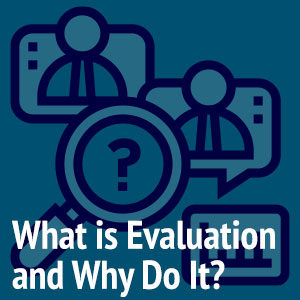 Evaluator competencies—the skills, knowledge and attitudes— required to be an effective program evaluator have been much discussed. (See, for example, The International Board of Standards for Training, Performance and Instruction Evaluator Competencies, and the CDC’s “Finding the Right People for Your Program Evaluation Team: Evaluator and Planning Team Job Descriptions.” )
Evaluator competencies—the skills, knowledge and attitudes— required to be an effective program evaluator have been much discussed. (See, for example, The International Board of Standards for Training, Performance and Instruction Evaluator Competencies, and the CDC’s “Finding the Right People for Your Program Evaluation Team: Evaluator and Planning Team Job Descriptions.” )
A good evaluator must, of course, be able to develop a research design, carry out research in the field, analyze data, and report findings. These technical/methodological skills, although of critical importance, are however, not the only skills that evaluators need. Effective evaluations also depend upon a range of interpersonal or relational skills that make effective and responsive interpersonal interaction possible.
I recently posted to the American Evaluation Associations listserv a query about the importance and role of the interpersonal skills in evaluation. I asked for AEA members’ opinions about the importance of interpersonal skills in conducting successful evaluations. A number of evaluators responded to my inquiry. The central theme of those responses was that successful evaluators and successful evaluation engagements require that evaluators possess and employ key interpersonal skills, and that without these, evaluation engagements are unlikely to be successful.
Among the most prominent reasons that my AEA colleagues reported for the importance of interpersonal skills were: 1) the importance of building strong, candid, and constructive relationships, on which effective data collection depends; and 2) the importance of establishing trusting and collaborative relationships between evaluators and stakeholders in order to help to ensure that evaluation findings will be utilized by clients and stakeholders. Additionally, some colleagues commented that the self-evident reason for utilizing strong interpersonal skills in evaluation engagements: these skills enhance the probability that clients and stakeholders will share information and provide insights about the program. Thus effective evaluation necessarily entails trusting, open, and amicable relationships that make access to program knowledge and information possible .
Reflecting on my 25 years of professional experience, which includes observing the work of many evaluators, I think that key interpersonal characteristics, include the abilities to:
- Build rapport and trust with clients, evaluands, and stakeholders
- Act with personal integrity
- Display a genuine curiosity and ask good questions
- Make oneself vulnerable in order to learn (see my earlier blog post on the role of vulnerability in learning and creativity at https://bradroseconsulting.com/secret-innovation-creativity-change/
- Actively listen
- Be empathic
- Be both socially aware and self-aware— i.e., be aware of, and manage, both one’s own and other’s emotions (including the features of emotional intelligence, i.e, capacities to accurately perceive emotions, use emotions to facilitate thinking, to understand emotional meanings, and to manage emotions).
- Treat each person with respect
- Manage conflict and galvanize collaboration
- Problem solve
- Facilitate collective (group) learning
- These interpersonal skills are central to successful program evaluations. Attention to these characteristics– both by program evaluators and by those seeking to engage a program evaluator (i.e. evaluation clients)— will greatly maximize the probability of successful evaluation projects.
To learn more about our evaluation methods visit our Data collection & Outcome measurement page.
Resources
Interactive Evaluation Practice: Mastering the Interpersonal Dynamics of Program Evaluation J.A. King and L. Stevahn (Sage).
Working with Emotional Intelligence. Daniel Goleman (Bantam)



